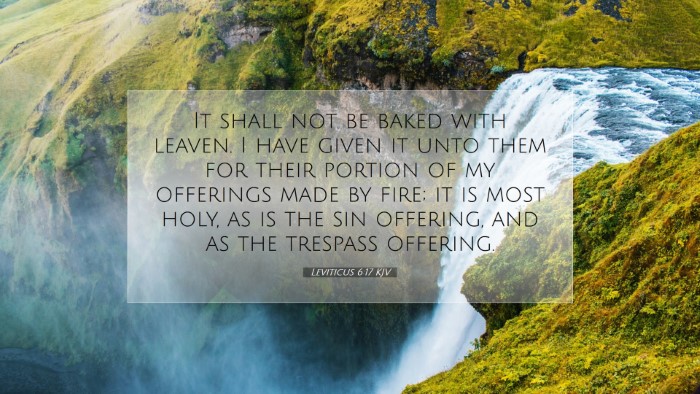Commentary on Leviticus 6:17
Verse Reference: Leviticus 6:17 - "It shall not be baked with leaven. I have given it to them for their portion of My offerings made by fire; it is most holy, like the sin offering and the trespass offering."
Introduction
The book of Leviticus serves as a vital component in understanding the holiness and covenantal relationship that God established with Israel. In this particular verse, we find regulations concerning the offerings made to God. Leviticus 6:17 delves into the nature of the grain offering, emphasizing the significance of purity and holiness in the worship of the Lord.
Contextual Background
The grain offering, also known as the meal offering, is one of the five primary offerings outlined in Leviticus (along with the burnt offering, peace offerings, sin offering, and trespass offering). This offering represents devotion and commitment to God, recognizing Him as the provider of all things. In this offering, the absence of leaven symbolizes a lack of corruption and sin, aligning with the overarching theme of holiness in the worship practices of ancient Israel.
Insights from Public Domain Commentaries
Matthew Henry's Commentary
Matthew Henry highlights that the prohibition of leaven in the grain offering is significant, as it mirrors the character of sin, which is often portrayed as leaven in Scripture. He states that leaven, which causes fermentation, represents corruption and moral decay, thus making it unsuitable for offerings presented to the Holy God. This restriction underscores the purity required in approaching God.
Henry further emphasizes that these offerings were not only a means of atonement but also acts of worship. They showcase the relationship between the giver and God; hence, every element of the offering, including the absence of leaven, was crucial in ensuring the offering was pleasing and acceptable in the sight of God.
Albert Barnes' Notes on the Bible
Albert Barnes elaborates on the importance of the grain offering being “most holy.” He reflects on how God's stipulation of having no leaven was not merely about avoiding a physical component; it was integrally tied to the spiritual state of the offering and the offering's recipient. He comments that these stipulations were intended to instill a deep respect for God’s holiness in the people; any approach to God in worship demands an understanding of His sanctity and an intent to present oneself with reverence.
Barnes notes that the grain offering’s association with the sin and trespass offerings highlights its sacrificial element; it points to the essential truth that all offerings would ultimately culminate in the ultimate sacrifice of Christ, who fulfilled the law and offered himself wholly, pure, and without sin.
Adam Clarke's Commentary
Adam Clarke provides a detailed analysis of the significance of the grain offering devoid of leaven. He indicates that the absence of leaven symbolizes not only moral purity but also spiritual sincerity. Clarke notes that falsehood and pretense have no place in true worship, urging the worshiper to approach God with sincerity and truth, devoid of any corruptible influences.
Moreover, Clarke points out that the grain offering was shared among the priests, symbolizing their portion of service and dedication to God. This aspect reveals the communal nature of worship and the importance of serving within the context of a covenant community, highlighting that worship is not only an individual act but a collective devotional expression among God’s people.
Theological Implications
As we probe deeper into the implications of Leviticus 6:17, several theological themes emerge:
- Holiness of God: The verse calls attention to God's holiness, serving as a reminder that any approach to God must be rooted in recognition of His character and precepts.
- The Nature of Sin: The prohibition of leaven serves as a metaphor for sin’s pervasive nature and its ability to corrupt. Believers are called to examine their lives for any such influences.
- Worship as Relationship: The grain offering illustrates the relational aspect of worship; it is not merely about rituals but about an ongoing relationship with God, characterized by commitment and honor.
- Foreshadowing Christ: The sacrificial system strains to reveal the necessity of an ultimate sacrifice, symbolizing how Christ would fulfill the requirements of the law through His purity and perfect sacrifice.
Conclusion
Leviticus 6:17 encourages believers to reflect on the nature of their offerings to God, not merely in terms of material sacrifice but in the purity of heart and motives. The insights from Matthew Henry, Albert Barnes, and Adam Clarke collectively illustrate that the act of offering to God is deeply intertwined with the character of the offerer. As spiritual leaders, students, and scholars, it is incumbent upon us to embrace these teachings, ensuring that our worship is heartfelt, sincere, and reflective of the holiness of our Creator.


